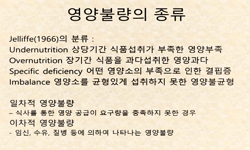The aim of this study was to analyse associations between dietary habits and nutrient intake of 250 male middle school students in Daegu area. To determine energy and nutrient intake, 24-hour dietary recalls were conducted. The Statistical Analysis Sy...
http://chineseinput.net/에서 pinyin(병음)방식으로 중국어를 변환할 수 있습니다.
변환된 중국어를 복사하여 사용하시면 됩니다.
- 中文 을 입력하시려면 zhongwen을 입력하시고 space를누르시면됩니다.
- 北京 을 입력하시려면 beijing을 입력하시고 space를 누르시면 됩니다.
대구 지역 중학생들의 식습관에 따른 영양소 섭취 상태 = Nutrient Intake in Middle School Students by Food Habit in Daegu Area
한글로보기https://www.riss.kr/link?id=A100352599
- 저자
- 발행기관
- 학술지명
- 권호사항
-
발행연도
2015
-
작성언어
Korean
- 주제어
-
자료형태
학술저널
-
수록면
113-128(16쪽)
- 제공처
-
0
상세조회 -
0
다운로드
부가정보
다국어 초록 (Multilingual Abstract)
The aim of this study was to analyse associations between dietary habits and nutrient intake of 250 male middle school students in Daegu area. To determine energy and nutrient intake, 24-hour dietary recalls were conducted. The Statistical Analysis Systems(SAS version 9.2 Institute, Cary, NC, USA) was used for the analyses. As a result, a high proportions of students reported having three meals a day (67.6%), eating from 10 to 20 minutes on average (55.2%), and having bread or cookies for snacks (56.0%). The patterns of dietary behaviour including rice meal for breakfast, unbalanced diet, skipping breakfast, and salty or spicy diet were 84.0%, 24.0%, 14.8%, and 12.4%, respectively. However, 17.2% of the subjects reported finding no problems on their diet. With regard to regularity of food intake, 39.6% of the subjects reported having their meals at regular intervals and 40.8% replied eating proper amounts of food per serving. The subjects who had daily intake of fruits and vegetable and daily intake of milk were 51.2% and 42.4%, respectively, and those who disregarded food combinations and nutritional value were 43.6%. When compared to other groups, the mean intakes of energy, carbohydrate, zinc, and vitamin C were significantly higher in the group who had daily intakes of fruits and vegetables, and the mean calcium intake was significantly higher in the group who had daily intake of milk. Also, the mean intakes of calcium, potassium, and zinc were significantly lower in the group who daily consumed instant food. The binge eating group had a significantly higher weight and height than others, whereas the unbalanced diet group had a significantly lower weights than others. The normal diet group had a significantly higher dietary fiber intake than the binge eating and unbalanced diet groups. The mean intakes of potassium, vitamin A, and beta-carotene were significantly higher in the normal diet group than the group with irregular diet. In conclusion, students reported eating more vegetable, fruit, and milk and less instant food showed a higher intake of important nutrient for growth such as calcium, potassium, and vitamin C. These findings provide evidence that food habit plays a role in nutrient intake in middle school students.
목차 (Table of Contents)
- 〈Abstract〉
- Ⅰ. 서론
- Ⅱ. 연구방법
- Ⅲ. 연구결과 및 고찰
- Ⅳ. 요약 및 결론
- 〈Abstract〉
- Ⅰ. 서론
- Ⅱ. 연구방법
- Ⅲ. 연구결과 및 고찰
- Ⅳ. 요약 및 결론
- 참고문헌
동일학술지(권/호) 다른 논문
-
산책과 동시활동의 통합이 유아의 언어표현력과 동시감상 능력에 미치는 영향
- 계명대학교 생활과학연구소
- 강연옥(Kang, Yeon Ok)
- 2015
-
- 계명대학교 생활과학연구소
- 박광희(Park, Kwang Hee)
- 2015
-
- 계명대학교 생활과학연구소
- 정정은(Chung, Jung Eun)
- 2015
-
대구지역 성인들의 연령별 떡에 대한 기호도 및 섭취실태
- 계명대학교 생활과학연구소
- 서현아(Seo, Hyun A)
- 2015




 DBpia
DBpia


